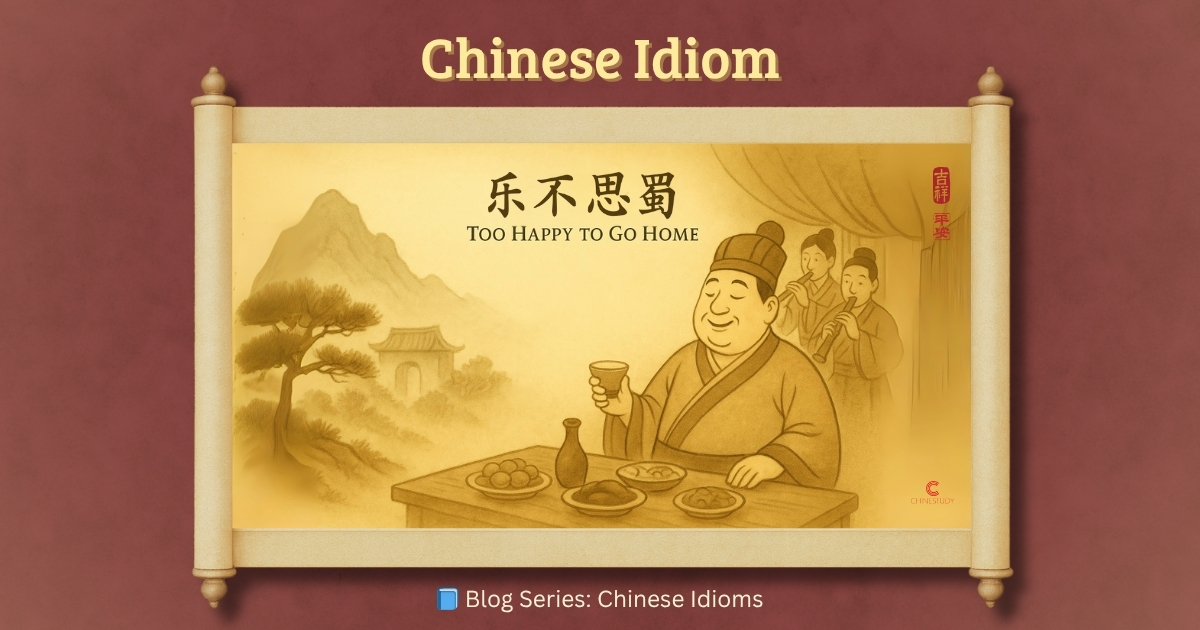🍷 乐不思蜀 lè bù sī shǔ - Too Happy to Go Home

🔍 What It Means
乐不思蜀 (lè bù sī shǔ) literally means:
“So happy that you forget to think about Shu (your homeland)”
Word-by-word breakdown:
- 乐 (lè) – happy, joyful
- 不 (bù) – not
- 思 (sī) – to think about, to miss
- 蜀 (shǔ) – the ancient kingdom of Shu (today’s Sichuan)
This idiom describes someone who is so happy in a new place, they forget about their old home, duty, or past.
In English, it’s like saying:
- 🏖 Too happy to return
- 🎉 Forgot where you came from
- 🛋 Loving the new life too much
🏺 Where It Comes From
This idiom comes from the story of Liu Shan, the last emperor of Shu, one of the Three Kingdoms in ancient China.
Around 1,500 years ago, the Kingdom of Shu lost a long and difficult war against the powerful Kingdom of Wei.
After the defeat, Emperor Liu Shan was taken to live in the capital of Wei.
Many people thought he would be heartbroken — after all, he had lost his throne, his land, and the country his father had built.
But to everyone’s surprise…
Liu Shan didn’t seem sad at all.
He lived in comfort, enjoyed fine food, music, and entertainment in the Wei palace, and adjusted quickly to his new life.
One day, Zhong Hui, a general from Wei tried to test Liu Shan’s loyalty.
He invited to a gathering and purposely arranged for the performers to play songs from Shu — the kind that would remind him of home.
But when Liu Shan heard the music, he didn’t sigh, cry, or feel homesick — he simply smiled and nodded along.
When people asked him whether he missed his homeland, he said cheerfully:
— “I’m very happy here. I have no reason to think about Shu!”
And so, the saying 乐不思蜀 (lè bù sī shǔ) was born.
It became a phrase to describe someone who is so content in their new situation… they completely forget their past, their home, or their responsibilities.
💬 How to Use It
Use 乐不思蜀 (lè bù sī shǔ) when someone enjoys a new place or situation so much, they don’t want to go back.
❌ Not used for deep, meaningful change
✅ Often used to tease someone who forgets home
✅ Common in travel, relationships, or work situations
✅ Sometimes used lightly to describe disloyalty or distraction
🎯 Real Examples
1.
他去了北京工作,天天吃喝玩乐,早就乐不思蜀了!
(Tā qù le Běijīng gōngzuò, tiāntiān chī hē wán lè, zǎo jiù lè bù sī shǔ le!)
👉🏻 He went to Beijing for work and has been partying every day. He totally forgot about home!
2.
女儿去留学才三个月,就已经乐不思蜀,不想回来了。
(Nǚ’ér qù liúxué cái sān ge yuè, jiù yǐjīng lè bù sī shǔ, bù xiǎng huílái le. )
👉🏻 My daughter went abroad to study, and after just three months, she’s already too happy to want to come back!
⚠️ Common Mistakes (Watch Out!)
❌ Mistake: Thinking it’s always positive
✅ Correct: It can be used jokingly — or as criticism for forgetting where you came from
💡 Memory Tip
Imagine you go on vacation.
At first, you say: “Just a few days!”
Then… the beach, the food, the fun — you forget your emails, your plans, your home.
Someone calls and asks, “When are you coming back?”
You smile and say, “Maybe… never?” 😄
That’s 乐不思蜀 (lè bù sī shǔ) — loving the new place too much to think about home.
🧩 Interactive Practice
Translate this sentence into English:
- 他搬到大城市以后就乐不思蜀了。
Answer:
After he moved to the big city, he was so happy he didn’t want to go back.
🌟 Final Thoughts
乐不思蜀 (lè bù sī shǔ) reminds us how easy it is to fall in love with a new life…
and how that joy can disconnect us from where we started.
Ask yourself:
Are you embracing something new — or forgetting where you came from? 🤔
🏮 One story ends, but many more await…
👉 Stay tuned for the next idiom in this series!
Thank you for subscribing!
Have a great day!